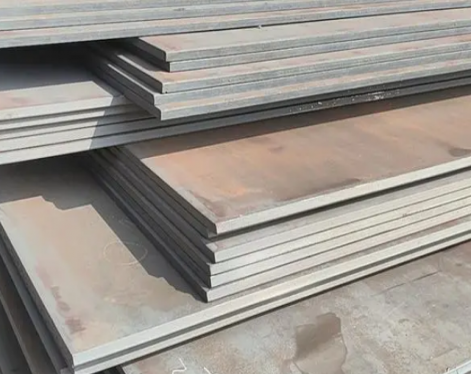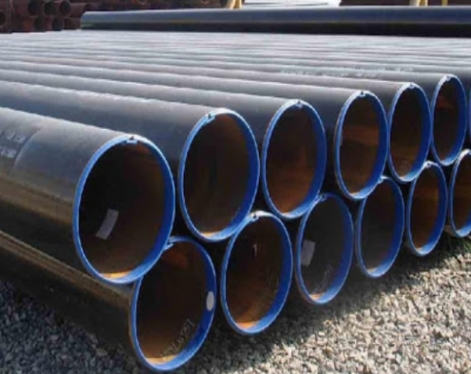The strength of a steel plate refers to the ability of a steel plate to resist deformation and damage when subjected to external forces, which is an important indicator for measuring the quality and performance of a steel plate. The strength of a steel plate is usually measured by indicators such as tensile strength, yield strength, and impact toughness. The most common materials for steel plates are carbon steel plates and stainless steel plates.
Definition and difference between tensile strength and yield strength:
Tensile strength: refers to the maximum tensile force that a steel plate can withstand per unit area during the stretching process. For example, the tensile strength of Q235 steel is generally between 370-500 MPa, which means that per square millimeter of area, Q235 steel can withstand a tensile force of 370-500 Newtons without being damaged.
Yield strength: refers to the stress limit at which a steel plate begins to yield when subjected to external forces. For Q235 steel, its yield strength is about 235 MPa. When the stress on a steel plate reaches this value, it begins to undergo plastic deformation.

Calculation method of steel yield strength:
The calculation formula of steel yield strength is: σs = F / A,
Where:
σs: steel yield strength, unit is MPa;
F: material force, unit is N;
A: steel cross-sectional area, unit is mm².
In addition to calculating by this formula, we can also get the value of steel yield strength through charts or tables in material data manuals. Different types of steel have different yield strengths, and the appropriate type of steel needs to be selected according to the specific force and use environment.
Classification of steel plate strength:
Low-strength steel: yield strength is less than 210MPa.
High-strength steel: yield strength is between 210MPa and 550MPa.
Ultra-high-strength steel: yield strength is between 550MPa and 900MPa.
Hot-formed steel: yield strength exceeds 900MPa.
For example, the yield strength of S460N steel plate reaches or exceeds 460MPa, and the tensile strength is between 540MPa and 720MPa, showing excellent high strength and high toughness2.
In addition, according to different application requirements, such as construction, bridges, ships, automobiles, aerospace, etc., there are different performance requirements for the strength, toughness, welding performance and corrosion resistance of steel plates.
Influencing factors:
1. Quality: The quality of the steel plate has a great influence on the yield strength. The different elements contained in its composition will affect its strength and wear resistance and other properties.
2. Heat treatment: Heat treatment can improve the strength and hardness of steel, but if it is not properly treated, it will reduce the strength.
3. Stress state: Different stress states will affect the yield strength of steel. Generally, the yield strength obtained in uniaxial tension is the largest.
4. Temperature: Temperature will affect the strength and plasticity of steel. Generally, the lower the temperature, the greater the impact on the toughness of the steel plate.
5. Shape and size: Shape and size will also affect the yield strength of steel. For example, when the thickness of the steel plate is small, its strength will be weakened due to the dispersion of metal particles.
Testing and application of steel plate strength:
The strength test of steel plates is usually carried out through tensile tests, impact tests and other methods. The tensile test can determine the tensile strength and yield strength of the steel plate, while the impact test can uate the impact toughness of the steel plate.
In practical applications, the strength of the steel plate directly affects its scope of use and safety performance. High-strength steel plates can withstand greater loads and impact forces, so they are widely used in bridges, buildings, vehicles and other fields that need to withstand heavy pressure. At the same time, the strength of the steel plate is also one of the important indicators for measuring the quality of the steel plate, which is of great significance for ensuring the quality and safety of the project.
Definition and difference between tensile strength and yield strength:
Tensile strength: refers to the maximum tensile force that a steel plate can withstand per unit area during the stretching process. For example, the tensile strength of Q235 steel is generally between 370-500 MPa, which means that per square millimeter of area, Q235 steel can withstand a tensile force of 370-500 Newtons without being damaged.
Yield strength: refers to the stress limit at which a steel plate begins to yield when subjected to external forces. For Q235 steel, its yield strength is about 235 MPa. When the stress on a steel plate reaches this value, it begins to undergo plastic deformation.

Calculation method of steel yield strength:
The calculation formula of steel yield strength is: σs = F / A,
Where:
σs: steel yield strength, unit is MPa;
F: material force, unit is N;
A: steel cross-sectional area, unit is mm².
In addition to calculating by this formula, we can also get the value of steel yield strength through charts or tables in material data manuals. Different types of steel have different yield strengths, and the appropriate type of steel needs to be selected according to the specific force and use environment.
Classification of steel plate strength:
Low-strength steel: yield strength is less than 210MPa.
High-strength steel: yield strength is between 210MPa and 550MPa.
Ultra-high-strength steel: yield strength is between 550MPa and 900MPa.
Hot-formed steel: yield strength exceeds 900MPa.
For example, the yield strength of S460N steel plate reaches or exceeds 460MPa, and the tensile strength is between 540MPa and 720MPa, showing excellent high strength and high toughness2.
In addition, according to different application requirements, such as construction, bridges, ships, automobiles, aerospace, etc., there are different performance requirements for the strength, toughness, welding performance and corrosion resistance of steel plates.
Influencing factors:
1. Quality: The quality of the steel plate has a great influence on the yield strength. The different elements contained in its composition will affect its strength and wear resistance and other properties.
2. Heat treatment: Heat treatment can improve the strength and hardness of steel, but if it is not properly treated, it will reduce the strength.
3. Stress state: Different stress states will affect the yield strength of steel. Generally, the yield strength obtained in uniaxial tension is the largest.
4. Temperature: Temperature will affect the strength and plasticity of steel. Generally, the lower the temperature, the greater the impact on the toughness of the steel plate.
5. Shape and size: Shape and size will also affect the yield strength of steel. For example, when the thickness of the steel plate is small, its strength will be weakened due to the dispersion of metal particles.
Testing and application of steel plate strength:
The strength test of steel plates is usually carried out through tensile tests, impact tests and other methods. The tensile test can determine the tensile strength and yield strength of the steel plate, while the impact test can uate the impact toughness of the steel plate.
In practical applications, the strength of the steel plate directly affects its scope of use and safety performance. High-strength steel plates can withstand greater loads and impact forces, so they are widely used in bridges, buildings, vehicles and other fields that need to withstand heavy pressure. At the same time, the strength of the steel plate is also one of the important indicators for measuring the quality of the steel plate, which is of great significance for ensuring the quality and safety of the project.









